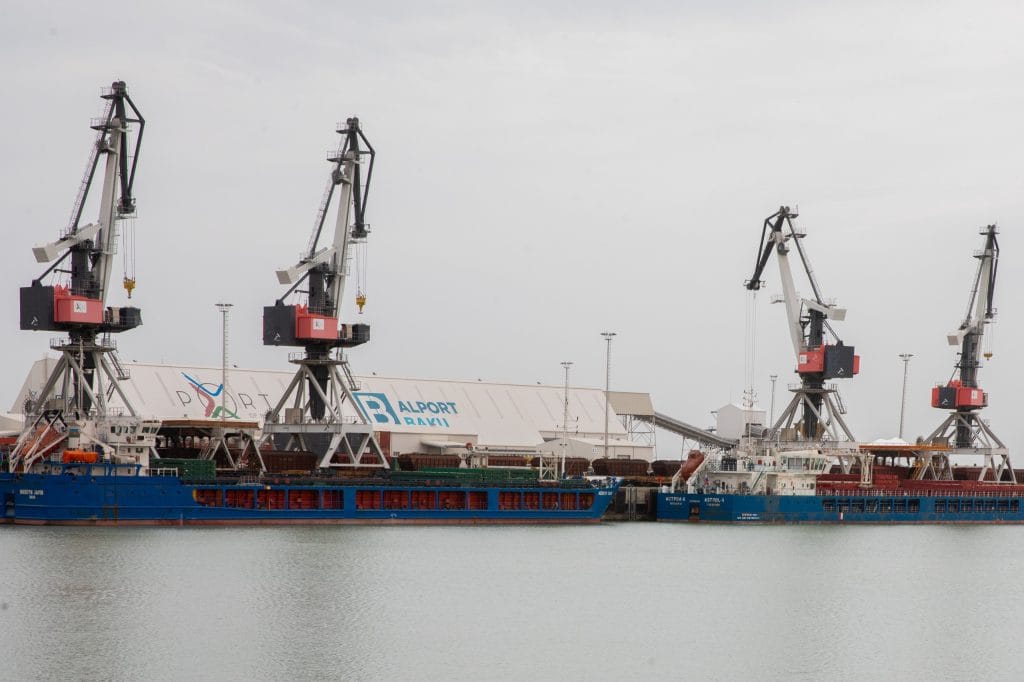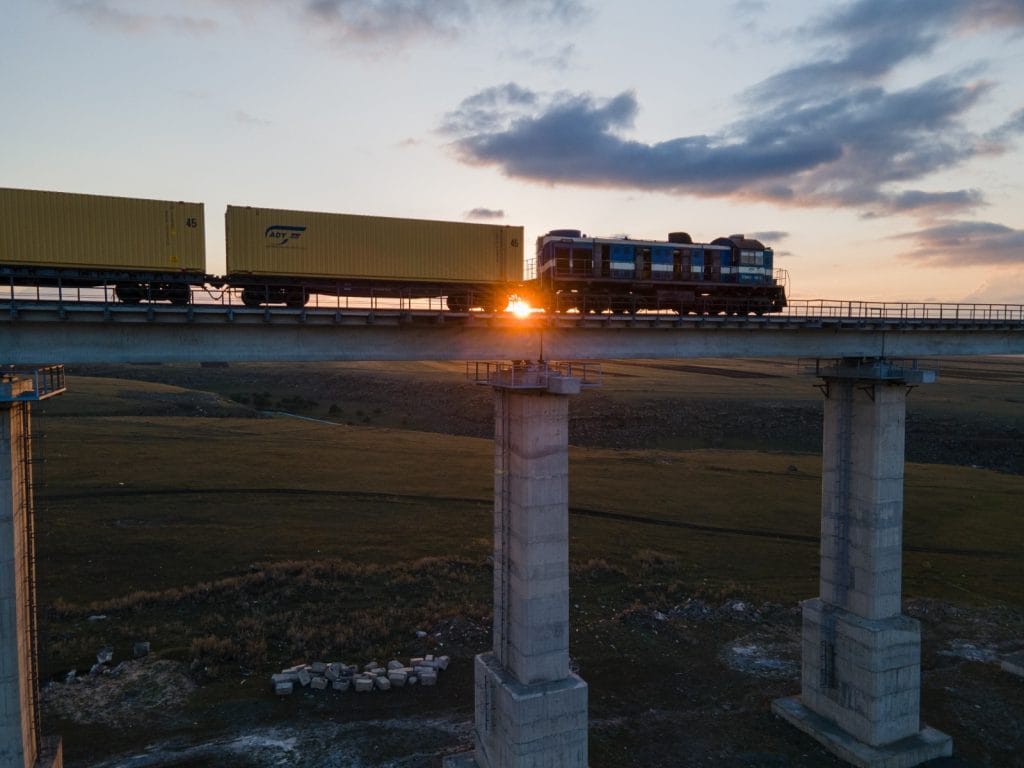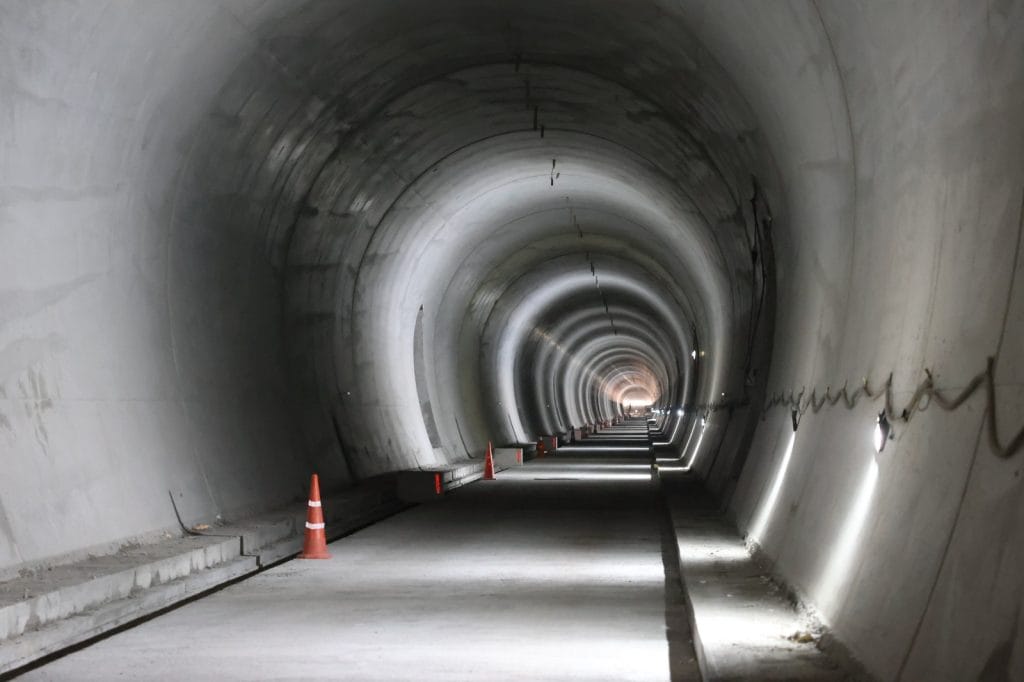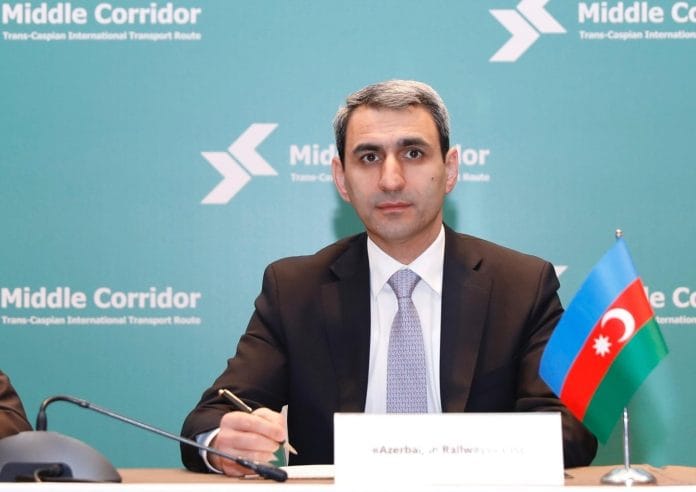After a recent trip to Baku, NE Global Media interviewed Azerbaijan Railways (ADY) Chairman Rovshan Rustamov, focusing on his organization’s critical strategic role regarding the important trans-Eurasian “Middle Corridor” connecting Europe to China through Turkiye, Georgia, Azerbaijan and Kazakhstan. The Azerbaijan Railways network and Baku’s Caspian Sea Port infrastructure are the lynchpins of the entire Middle Corridor, shepherding freight trains from Kazakhstan arriving by Caspian Sea ferry across the country to the border with Georgia, where the trains continue to Turkiye and eventually to Europe.
NE Global (NEG): What’s the status of railroad upgrades for the Middle Corridor, and has the route reached its highest transit capacity yet? Which month?
Rovshan Rustamov (RR): The Middle Corridor has undergone significant transformation in recent years. Together with our partners in Georgia and Kazakhstan, we have invested heavily in infrastructure upgrades, digital solutions, and harmonized customs procedures. These efforts are generating tangible results. In the first ten months of this year, ADY handled 317 block trains, including 119 transit trains – a 32 percent increase compared to the same period last year. Over the same period, a total of 112,608 TEU (TEU – Twenty foot equivalent unit, the current standard unit for container shipping capacity) of containerized cargo was transported, which is about 18 percent higher than the corresponding figure for 2024 (95,483 TEU). The Middle Corridor is increasingly viewed not as just an alternative to northern and southern routes, but as a preferred channel for its growing efficiency and reliability. Each year we set new records while continuously raising the standard of service we deliver to our international partners.
NEG: What progress has been made in Baku Port capacity expansion compared to plans?
RR: The Port of Baku plays a central role in the Middle Corridor, and we have made exceptional progress in its development. Our expansion plan is not only on track but in some respects ahead of schedule. The introduction of the Unified Transit Center has significantly streamlined operations, cutting waiting time, lowering costs and accelerating cargo handling.

Meantime, container turnover at the Port has reached record levels, which highlights both the growing demand and the effectiveness of our new infrastructure. Through the Baku International Sea Trade Port, 6,832,087 tons of cargo were handled in the first ten months of 2025. This is a 5.6 percent increase compared to the same period last year and marks the highest result in the past 22 years. Looking forward, we continue to invest in the Port capacity and digital tools to ensure that the port remains a world-class logistics hub for the Caspian region and beyond. This is a success story that directly supports Azerbaijan’s vision of becoming a global transport and logistics center.
NEG: How is ADY’s modernization and digitalization program proceeding? Is this supported by international donors?
RR: Our modernization program is one of the most ambitious transformations in the history of Azerbaijan Railways. We are implementing a wide range of innovations, from digital cargo tracking to fully integrated electronic customs systems. These tools are making transport more transparent, predictable, and efficient.
International partners, including development banks and donor institutions, are actively supporting this program. Their involvement is not only financial but also technical, providing us with expertise and best practices from around the world. The fact that leading global institutions are investing in ADY’s modernization reflects their trust in Azerbaijan’s transport vision and the long-term viability of the Middle Corridor. For us, modernization is not a one-time project, it is a continuous process of innovation.
NEG: Does Azerbaijan consider the Middle Corridor a component of China’s Belt and Road Initiative?
RR: Azerbaijan views the Middle Corridor as both an independent project and a natural complement to China’s Belt and Road Initiative (BRI). We are very clear on this point: the Middle Corridor is not subordinate to any one initiative. Instead, it is a strategically autonomous route that can cooperate with multiple global projects, including the BRI.

This flexibility is our strength. It means the Middle Corridor can serve Chinese partners, European businesses, and regional economies with equal efficiency. In essence, Azerbaijan is positioning itself as a neutral and reliable bridge between East and West, offering partners the choice and flexibility they need in today’s complex geopolitical environment.
NEG: Much has been written about the TRIPP (Trump Route for International Peace and Prosperity) corridor. How will this new line connect to the Türkiye’s rail grid, and what will its throughput capacity be?
RR: The TRIPP corridor is an important development that will directly connect Azerbaijan to its Nakhchivan exclave via Armenia, before linking seamlessly to Türkiye’s railway system. Türkiye has already begun construction on its section of this 224-km line, which demonstrates strong political and financial commitment.
As for Azerbaijani section, we’re now building the 110 kilometers long Horadiz–Aghband railway. Work began in 2021 and will finish by 2026. Along the way, we’re building eight new stations – from Yukhari Marjanli all the way (Shukurbayli, Soltanli, Gumlag, Hakari, Minjivan, Bartaz) to Aghband. So far, about 85 percent of the design and 68 percent of construction and installation works are done.

Moreover, the feasibility study for the reconstruction and modernization of the railway infrastructure in the Nakhchivan Autonomous Republic has already been completed, and design work is currently underway. Once this phase is finalized, construction will begin, and a new railway network meeting modern standards will be built.
From the start, the TRIPP corridor is being designed with scalability in mind. Initial capacity will allow a steady flow of freight, but the infrastructure can be expanded to meet rising demand. Over time, it has the potential to rival the Baku–Tbilisi–Kars (BTK) line in terms of throughput. What is important is that TRIPP adds resilience and redundancy to the network, ensuring that Azerbaijan always has multiple corridors at its disposal.
NEG: Is TRIPP a competitor to the Middle Corridor, or simply a supplement? Could it ever handle more traffic into Türkiye than the Baku–Tbilisi–Kars route?
RR: I would describe TRIPP as a strategic complementary initiative that supports and enhances the Middle Corridor’s objectives. The reality of global logistics today is that businesses seek multiple options and resilient supply chains. TRIPP provides another reliable link into Türkiye, while BTK continues to serve as the backbone of trans-Caspian rail transit.
In the long run, traffic distribution will depend on market demand, but we fully expect BTK to retain its role as the main artery. At the same time, TRIPP ensures that Azerbaijan’s transport system is more robust, flexible, and attractive to international partners. Both corridors will work in synergy, not in competition.
NEG: Since all rail corridors enter Türkiye through Kars, does everything still have to pass the Marmaray tunnel in Istanbul to reach Europe?
RR: Yes, that is correct. Whether cargo arrives via the BTK or through the TRIPP corridor, it will enter Türkiye through Kars and continue westward across the country. The Marmaray tunnel under the Bosporus in Istanbul remains the key link for Eurasian rail traffic into the European Union.
This reality underscores the strategic importance of Türkiye as a transit country and the importance of continued investment in Türkiye’s rail infrastructure. Azerbaijan is working closely with Türkiye to ensure that connectivity from Kars to Istanbul and beyond is seamless, efficient, and capable of handling the growing demand.







